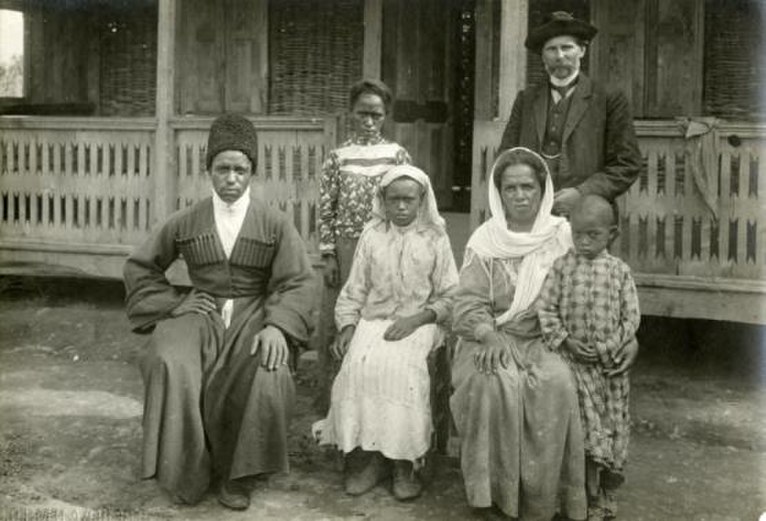Photo of Afro-Abkhazian family from Caucasus

A picture is worth a thousand words…
Many people may not be aware of this story but yes there are black Russians who descended from their ancestors probably Egyptians or Ethiopians who lived there since the time of the Colchians (2000 years ago at least).
According to a Wikipedia article, the ethnic origin of the Abkhazians of African descent — and how Africans arrived in Abkhazia — is still a matter of dispute among experts. By experts it refers to confused members of the European academia.
But the story of the Black Abkhazians is yet a living story as they are not all dead. They or their descendants still live around Adzyubzha in Abkhazia of today.
According to the Muurish Abkhazians, or the Abkhazians of African descent themselves, they are the descendants of the Colchians, the inhabitants of the ancient kingdom of Colchis in present-day western Georgia, deep in the Caucasus region.
It appears that they have continued in a quiet unbroken line up to this very day, authenticating the stories told by Herodotus the father of Western History almost 2000 years ago.
According to Herodotus, some contingents of the soldiers of Sesosotris the great Egyptian Pharoah who conquered the known world.
He was said to have left an Egyptian colony near Abhkazia, and in the time of Herodotus, the people of Colchis were still predominantly dark brown in colour, and they all had wooly or frizzy hair. Even then, they still clearly recalled their historical origins as they do even today.
Another account holds that certain Ethiopians and Black Hebrew Israelites had emigrated to the region, in a time that was lost to human recollection.
An Abkhazian writer Dmitry Gulia in the book “History of Abkhazia” compared the place names of Abkhazia and the corresponding names in Ethiopia and claimed that some of the geographical names are identical: Bagadi – Bagadi, Gunma – Gunma, Tabakur – Dabakur, etc.
In 1927, the Russian writer Maxim Gorky, together with the Abkhaz writer Samson Chanba visited the village of Adzyubzha and met elderly Africans there. Based on his visit and comparison of his observations with the published data, he felt that the Ethiopian version of the origin of the Abkhazians of African descent is true.
They could also be likely connected with the Moorish population of the Roman Empire who were among the pioneers of civilization and Roman administration in many regions of Europe.
Or they could be connected to the Mauro or the Nigiri Latinis, black aborigines of Europe, who were latin in speech and had spread between Iberia, Italy, Serbia Monte Negro, into Bulgaria, Romania, and Russia.
One hears echos of those long gone Nigri Latinis, in dark and forbidden tales about the little black people who haunt the thicker forests and woods of Western and Eastern Europe. Perhaps the Abkazians are their descendants.
Whatever be the truth in all these theories, what cannot be denied is that there are black people, a Muurish people living today in the remote areas of the Russian Caucasus region, whose ancestry go back hundreds of years and of whom the world rarely acknowledges.
They might actually be the original Caucasians since every other neigbouring tribe came in way after the time of Herodotus, who testified to the presence of Muurs in Abkhazia at least 2000 years ago.
Oguejiofo Annu
April 25 2012
Sources
Zinaida Richter, Adzyubisa (1930)


A combination of people;Khemtic,Ethiopian, and other Black-African nationalities combined to make the Afro-Abkhazians thru the years. Informative article to lead to more research.
Here more sources on African Abkhazians
http://abkhazworld.com/articles/newspaper-archives/752-when-did-africans-get-to-soviet-union-1973.html
http://abkhazworld.com/articles/newspaper-archives/754-many-africans-came-to-the-soviet-afro-american-part-ii.html
http://abkhazworld.com/articles/newspaper-archives/757-skin-color-creates-no-barrier-afro-american-final-1973.html
http://abkhazworld.com/abkhazia/history/756-african-presence-in-former-soviet-kfikes-alemon.html
When I was a student in Moscow, I used to think that Russians were just being racist when referring to the people of Kavkaz(the Caucasuses) as blacks. Well it seems they were probably just stating facts.